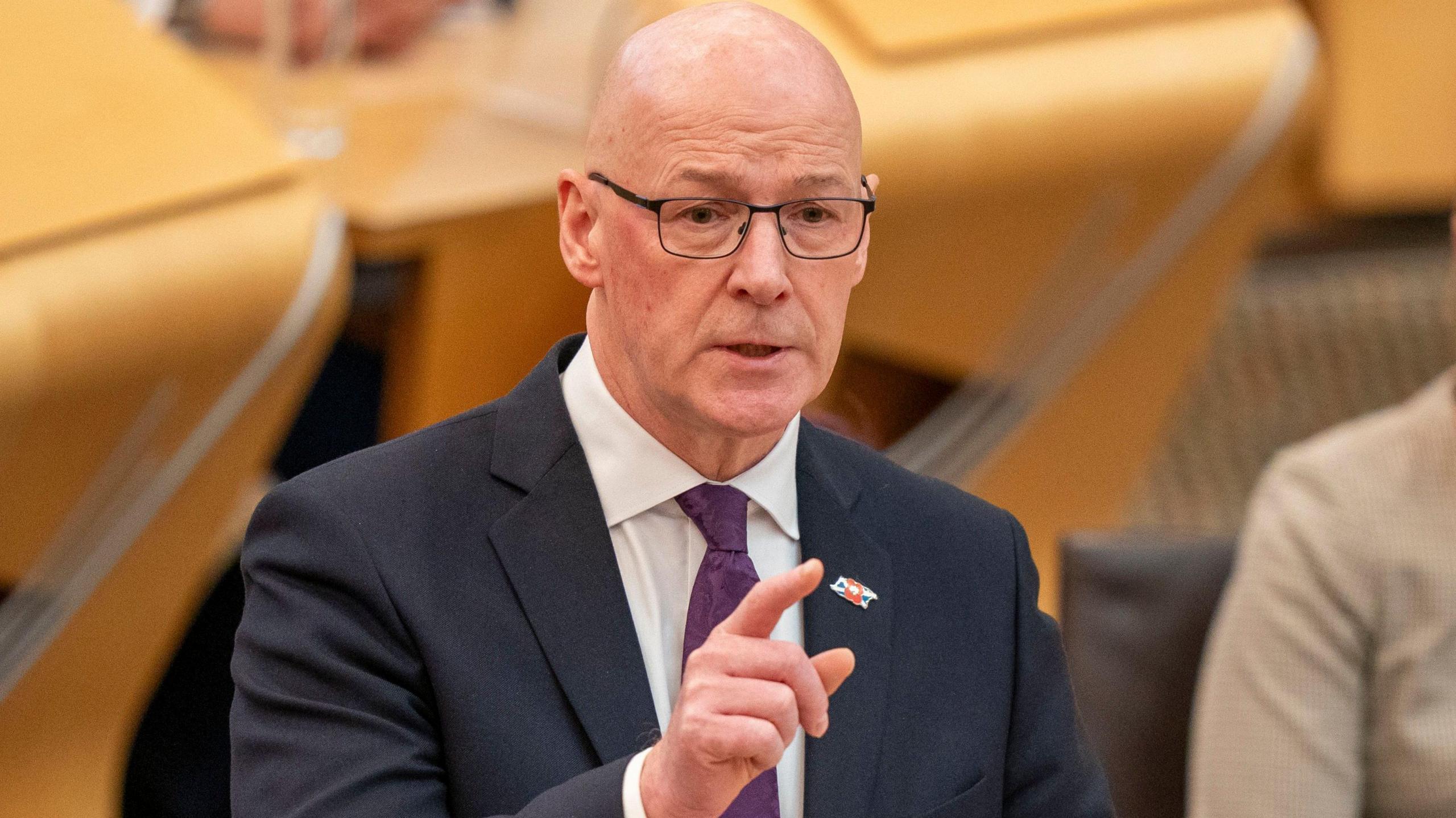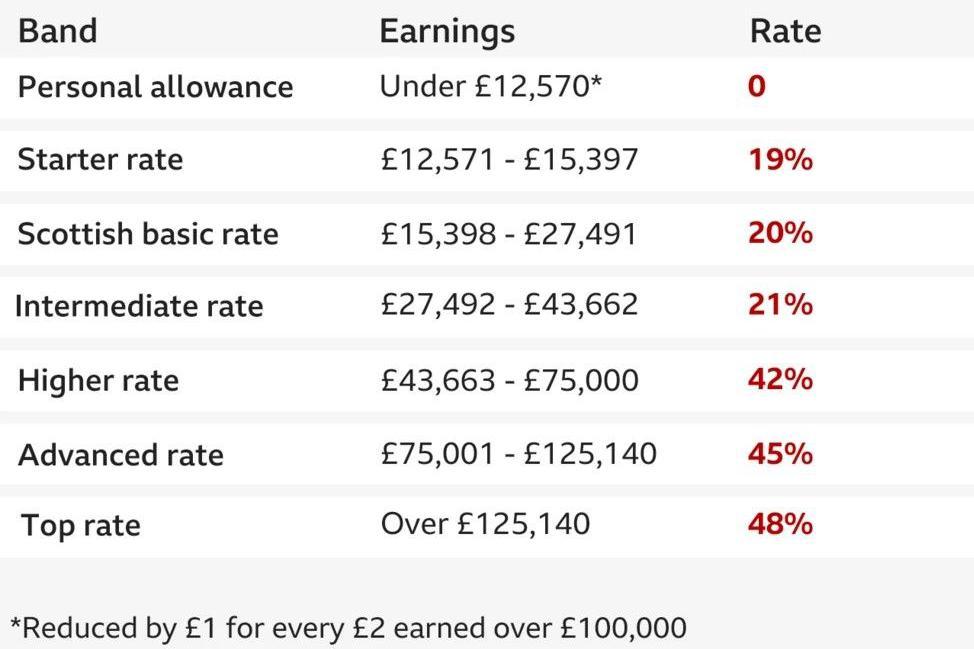Swinney does not rule out tax hikes in Scotland

John Swinney has previously called on the UK government to raise taxes
- Published
First Minister John Swinney has refused to rule out tax increases in next year's Scottish Budget.
His government has been warned it could face a £1bn funding shortfall if the UK government raises income tax rates in England, Wales and Northern Ireland.
Chancellor Rachel Reeves has fuelled speculation that she is considering such a move, which would lead to an automatic deduction from Scotland's funding from the Treasury.
Swinney - who last week insisted he would not raise income tax - told MSPs he was waiting to see the "implications" of the UK government budget, which will be announced later this month.
'Hammer blow'
At First Minister's Questions, Scottish Conservative leader Russell Findlay asked Swinney to give a "cast-iron guarantee" that he would not increase income, business or property taxes.
Swinney said his government would reveal its tax and spending plans when it announced its budget on 13 January.
The Scottish government has used its devolved powers to create what it describes as a fairer, more progressive income tax system.
The first minister said that allowed the government to help fund free university tuition, prescriptions, free bus travel for under-22s and action against child poverty.
He added: "We will bring forward orderly budget provisions which will relate to the tax and spending commitments so that we can fund our public services and fund the investments in the Scottish economy."
Speaking after FMQs, Swinney told journalists that there had been a change in the political landscape, "fuelled by the chancellor", in the days since he had recommitted to not raising income tax.
The first minister pointed out that the UK government had previously pledged not to increase taxes, having made a manifesto commitment last year not to hike income tax, VAT or National Insurance.
He added: "I'm simply looking at the changing lie of the land and finding the ways in which the Scottish government can respond to that openly and transparently with the public."
Findlay warned that a tax rise would be a "hammer blow to Scots".
The Tory MSP said hikes were "unsustainable", adding: "People deserve to keep more of their hard-earned cash."

In Scotland, people earning below about £30,300 pay slightly less income tax than they would elsewhere in the UK, with a maximum saving of about £28.
Above that threshold they pay increasingly more as earnings increase. Someone on £50,000 in Scotland pays £1,528 more than they would in the rest of the UK. That rises to £5,207 for someone on £125,000.
Last week, Swinney told a conference organised by the think-tank IPPR Scotland that the government was standing by its commitment not to change income tax rates before the end of the parliamentary term in May next year.
Speculation that the Scottish government may have to increases taxes mounted after Reeves refused to rule out hikes south of the border.
The chancellor pledged that she would do what was "necessary" to protect public finances.
Why would a UK tax hike cut Scotland's budget?
A change to UK income tax - which applies in England, Wales and Northern Ireland - would not directly affect Scottish taxpayers, but an increase would lead to an automatic deduction from the block grant that the Scottish government receives from the Treasury.
That is because the UK government is able to deduct funds from the block grant that it estimates it would have received if tax-raising powers were not devolved to Holyrood.
The Fraser of Allander Institute, an independent economic research unit at the University of Strathclyde, has estimated that a two percentage point increase in the basic rate of UK income tax would lead to a cut of about £1bn in Scotland's block grant in each of the next three financial years.
Despite this, Swinney has repeatedly called on the UK government to raise income tax, claiming it could raise revenues and negate the need for budget cuts.

John Swinney made it sound like the most sensible thing in the world – he can't rule out tax rises, because he needs to see what the Chancellor gets up to in her budget later this month.
The only problem is, he was able to do exactly that just last week.
Last December, Shona Robison said there wouldn't be changes to rates or bands before next year's election, a position Swinney was "very happy to reinforce" last Wednesday.
But having spent the past year banging the drum for the UK government to increase taxes rather than make cuts to budgets, the prospect of Rachel Reeves actually doing so has put Swinney and Robison in a pinch.
This is because of a thing called the block grant adjustment. Now that income tax is devolved, each year the amount of money Holyrood would have got under a UK-wide tax regime is subtracted from the block grant, and Scottish ministers set their own rates to replace it.
If UK income tax receipts go up, so does the size of the block grant adjustment – and devolution means ministers here get to decide if they replicate the tax rises.
Overall it might not matter, if UK spending increases and the block grant itself goes up. But if the Chancellor uses the money to plug gaps or increase her fiscal headroom, then Holyrood's budget will take a hit.
Given John Swinney was the one who negotiated the fiscal framework and the form of block grant adjustment, he surely understood all of this when he was demanding UK tax rises while also pledging not to increase rates here.
He seems to have been caught out by the unexpected move from Rachel Reeves to do what he had asked and ditch her long-held fiscal rules.